六年级上册英语语法讲义现在完成时牛津上海版(一起).doc
牛津沪教版六年级上6AUnit8重点词汇句型复习及现在完成时学习
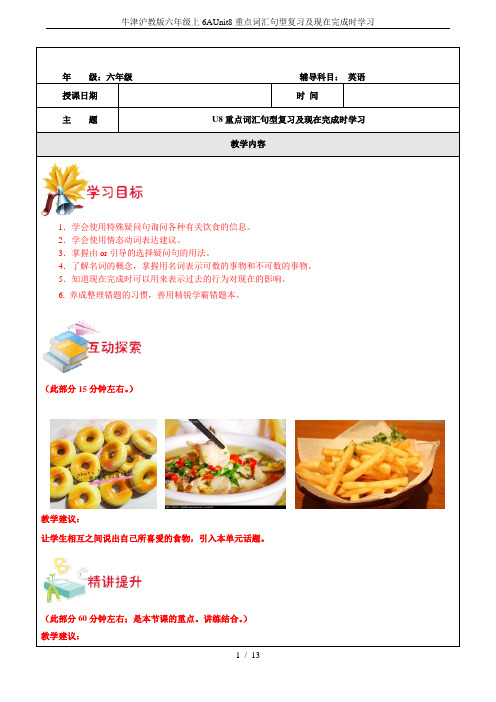
年级:六年级辅导科目:英语授课日期时间主题U8重点词汇句型复习及现在完成时学习教学内容1.学会使用特殊疑问句询问各种有关饮食的信息。
2.学会使用情态动词表达建议。
3.掌握由or引导的选择疑问句的用法。
4.了解名词的概念,掌握用名词表示可数的事物和不可数的事物。
5.知道现在完成时可以用来表示过去的行为对现在的影响。
6. 养成整理错题的习惯,善用精锐学霸错题本。
(此部分15分钟左右。
)教学建议:让学生相互之间说出自己所喜爱的食物,引入本单元话题。
(此部分60分钟左右;是本节课的重点。
讲练结合。
)教学建议:建议讲解前,让学生自我挑出不认识的单词,然后相互学习,看是否能解决。
老师讲解完毕后,让学生相互之间抢答竞赛,优先说出单词或者汉语意思的学生获胜。
重点词汇1.also adv. 也;还;同样(放在句中)e. g. You are 11 years . I am also the same age. 你11岁,我也是同岁。
【知识拓展】too 也,放在肯定句的句尾,逗号隔开; either 也,放在否定句句尾,并用都好隔开2. kind n. 种类a.和蔼的宽容的e. g. There are many kinds of fruit in the fruit shop .水果商店里有很多种类的水果。
Our English teacher is very kind. 我么你的英语老师很和蔼。
【知识拓展】all kinds of……各种种类,a kind of …一种……3. fry v. 油炸;油煎;油炒e. g. They like to fry something to eat . 他们都喜欢炸东西吃。
【知识拓展】fried a. 油炸的e.g. Children like fried food nowadays. 现在孩子都喜欢油炸食物。
4. frozen adj. 冷冻的,冰冻的e.g. Frozen food are easy to keep for a long time. 冷冻食物容日保存很长时间。
六年级上册英语语法讲义重点词汇句型复习及时间状语从句学习牛津上海版(一起).doc

六年级上册英语语法讲义重点词汇句型复习及时间状语从句学习牛津上海版(一起)授课日期时时间主主题重点词汇句型复习及时间状语从句学习学习目标(本次课的重点、难点以及达到怎样的情感目标) 1. 学会用by 和on 表示乘某种交通工具或步行去某地。
2. 掌握It takes somebody sometime to do something 的句型表达某人花了多少时间做某事。
3. 学会使用 How long 来询问多长时间。
4. 学会使用 a few 、some 、a lot of 等来限定名词的数量。
5. 掌握 when 引导时间状语从句的用法。
6. 养成整理错题的习惯,善用精锐学霸错题本。
教学内容 1 、上次课后巩固作业复习; 2 、互动探索分(此部分 15 分钟左右。
)教学建议:让学生相互之间了解一下彼此上学乘坐交通工具的方式,及所需的时间。
引导学生用本单元的重点句型来练习:How do you go to school? 及How long does it take? 及其相对应的应答I go to school by______ 、It takes about __________ 分(此部分 60 分钟左右;是本节课的重点。
讲练结合。
)教学建议:建议讲解前,让学生自我挑出不认识的单词,然后相互学习,看是否能解决。
老师讲解完毕后,让学生相互之间抢答竞赛,优先说出单词或者汉语意思的学生获胜。
重点词汇讲评【理知识梳理 1】 travel v. 行走;旅行 hour n. 小时 when conj. 当的时候 about adv. 大约 hotel n. 旅馆 kindergarten n. 幼儿园minute n. 分钟 advertisement n. 广告 temple n. 庙宇 ferry n. 渡船 board n. 栏;板 half an hour 半小时 a few 几个 a lot of 许多 light rail 轻轨 department store 百货商店 housing estate 居民区 1. travel v ./ n. 行走,旅行【知识拓展】traveltraveledtraveledtraveling 或者traveltravelledtravelledtravelling 注意过去式、过去分词及现在分词,l 可以双写,也可以不双写。
沪教版牛津英语六(上)语法点
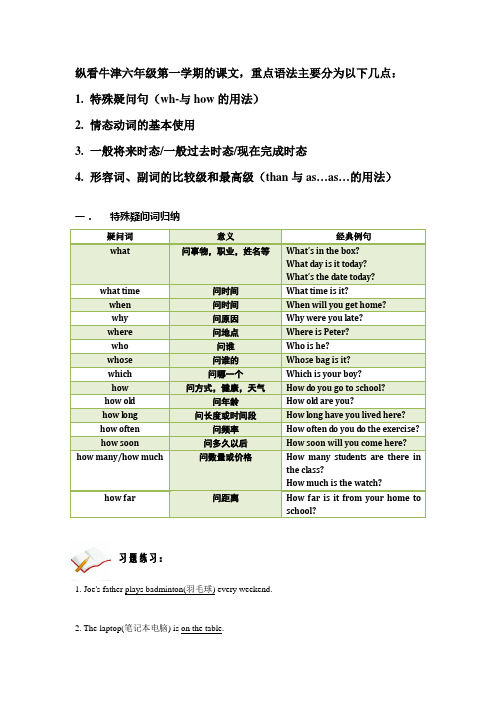
纵看牛津六年级第一学期的课文,重点语法主要分为以下几点:1.特殊疑问句(wh-与how的用法)2.情态动词的基本使用3.一般将来时态/一般过去时态/现在完成时态4.形容词、副词的比较级和最高级(than与as…as…的用法)一.特殊疑问词归纳疑问词意义经典例句what 问事物,职业,姓名等What’s in the box?What day is it today?What’s the date today?what time 问时间What time is it?when 问时间When will you get home?why 问原因Why were you late?where 问地点Where is Peter?who 问谁Who is he?whose 问谁的Whose bag is it?which 问哪一个Which is your boy?how 问方式,健康,天气How do you go to school?how ol d 问年龄How ol d are you?how long 问长度或时间段How long have you lived here?how often 问频率How often do you d o the exercise?how soon 问多久以后How soon will you come here? how many/how much 问数量或价格How many stud ents are there inthe class?How much is the watch?how far 问距离How far is it from your home toschool?习题练习:1. Joe's father plays badminton(羽毛球) every weekend.2. The laptop(笔记本电脑) is on the table.3. My mother is a nurse in the hospital.4. He gets up at 6:30 in the morning.5. Li Lei goes to work on foot.6. It is about 20 kilometers from my home to the town.7. I have lived in Hang Zhou for 20 years.8. I’m looking for my watch.9. The train will start in three minutes.10. Alice has the violin lesson twice a week.11. The building with green wall is the post office.12. He didn’t come because he was ill.注意事项:由于特殊疑问词孩子们从小学就已经开始接触,对于最基本的what/how/where等并不感到陌生,出题的难度一般也不会很大。
六年级上册英语语法讲义期末复习1牛津上海版(一起).doc

处理上次课课后巩固作业及预习思考内容。
朗读下面的幽默请同学们来分别朗读一下自己圈出的词及写的句子"All the kids make fun of me/ the boy cried to his mother, "They say I have a big head/1"Dorft listen to them/1 his mother comforted him, ”You have a beautiful head ・ Now stop crying and go to the newly opened store for forty pounds of potatoes.11"How long does it take to get to the store by bike?"(特殊疑问句) “lt ,s not far.You can go there on foot ,, T don^t think we need a lot of potatoes 55 “Just go and get them”"But where's the shopping bag?"(特殊疑问句)MI haven't got one, use your hat.”“所有的孩子都拿我开玩笑,”小男孩哭着跟妈妈说:“他们说我长了一个大脑袋。
”“别听他们的,”他妈妈安慰说:“你的脑袋长得很漂亮。
好了,别哭了,去商店买10磅土豆来。
” “购物袋在哪? ”“我没有购物袋,就用你的帽子吧。
” 仿句:1.问“谁”用who 或whom o 如:Li Lei is a doctor.?Who is a doctor?学员姓名: 年 级:六年级授课日期学科教师: 辅导科目:英语 时 间 期末复习学习目标期末复习教学内容(对主语提问用who,对宾语提问用who, whom均可)去游泳: go swimming 去爬山:go clambing★ each other/ one another【用法提示】each other 用于两者,one another 用于三者或三者以上★ be friendly to sb/be friendly with sb【用法提示】l)be friendly to sb.u ...对某人友好”或“对某人友善",指对别人的态度友好;be friendly to sb=be kind to sb.o 2)friendly adj 一friend n 一friendship n★ help v — helpful adj — helpless adj★ pick uppick sth up/pick up slh; pick it /them up. ★ Promise vpromise (not) to do sth.承诺(不)去做某事★说谎/平躺/下蛋★ pollute v -pollution nair pollution 大气污染 water pollution 水污染 oceanpollution 海洋污染 land pollution 土地污染ground water pollution 地下 水污染noise pollution 噪音污染★ sometimes/sometime/some time / some times【小贴士】分开一段时间(some lime),相聚某个时候(somclime)S连住是有时(sometimes),分开几次几倍行(sometimes)♦ phrasesbe late for 迟到tell lies 说谎for the first time 笫一次walk to school=go to school on foot Take care of=Iook after建议表达法:how about doing= what about doing; lefs do =shall we do ; why not do =why don f t you do【巩固练习】1.( ) ....... .................. ou __________ any books?....... Yes, I __________ them two weeks ago.A.Have...bought; have bought B・ Did...bought; boughtC・ Have ...bought; bought D. Did...buy; have bought2.( )The Smiths _____________ Shanghai for five years.A・ have been to B・ have gone toC・ have been in D. have gone in 3.1 have already been to Hainan Island.(改为否定句)I ___________ been to Hainan Island ____________ ・4、E veryone should help to fight ________________ ・/p$lu:Jh/5、() My films are under the desk. Who can pick them ______________ for me?A. /B. awayC. fromD. up6、()We promise ___________ polluting the environment.A. stopB. to stopC. not to stopD. stopped7、H ow about _________ (walk) to school every day, Ben?How about __________ (clean) the room now?★find out/find/look for【用法】find out:弄明白;find:发现;look for:IE在找(没找到)Keys:Lspent on 2-6 DCDBD【知识梳理2】语法复习 【例题精讲】♦How questions: How 问句:(1) How long does it take you to get to...?句中的how long 用含有哆长吋间”词语的问句来问吋间长短。
上海牛津版六年级上Unit 1知识梳理
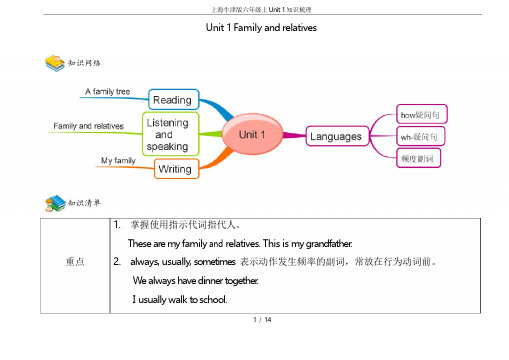
Unit1Family and relatives知识网络知识清单1.掌握使用指示代词指代人。
These are my family and relatives.This is my grandfather.重点 2.always,usually,sometimes表示动作发生频率的副词,常放在行为动词前。
W e always have dinner together.I usually walk t o school.1/14W e sometimes go swimming at the weekend.3.go shopping去购物,去买东西Alice and Betty often go shopping on Sundays.go+现在分词(v+ing)组成的词组表示“去(干……)go cycling,go swimming,go fishing1.The simple present tense一般现在时,尤其第三人称的变化和使用。
2.掌握并应用以下重点词汇及短语难点What else….?/only/family and relatives/a family tree/grandsons andgranddaughters/family members/with sb.易错点 1.一般现在时(尤其第三人称)否定及疑问的变化。
1.have的否定句和疑问句结构。
高频考点 2.always频度副词。
3.go doing表示进行某项活动。
牛津词汇2/14relative family tree granddaughter grandson only member*classmate n.亲戚;亲属家谱n.孙女;外孙女n.孙子;外孙adv.仅仅n.成员;会员n.同班同学sh o pgo shoppingelse*badmintoncyclego cyclingv.购物去购物adv.别的;其他的n.羽毛球v.骑自行车去骑自行车知识梳理第一部分:词汇精讲1.relative n.亲戚;亲属Do you have any relatives in Shanghai?你在上海有亲戚吗?【联想】family tree家谱,family member家庭成员【头脑风暴】granddaughter n.孙女;外孙女gr eat-granddaughter n.曾孙女;曾外孙女grandson n.孙子;外孙gr eat-grandson n.曾孙子;曾外孙grandfather n.祖父;外祖父grandmother n.祖母;外祖母3/14uncle n.叔叔,舅舅,姑父,叔父aunt n.阿姨,姑姑,舅母,婶婶sister n.姐,妹brother n.兄,弟cousin n.堂/表兄弟姐妹区别relative和family区别含义:在英语国家中,family通常指自己的父母、兄弟姐妹等成员;而relative指的是除此之外与自己有血缘关系或非血缘关系的亲属。
上海牛津六年级英语上册完美讲义完整版
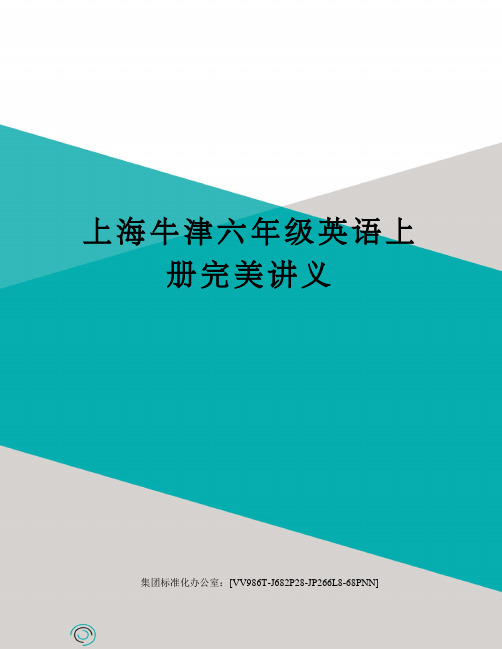
上海牛津六年级英语上册完美讲义集团标准化办公室:[VV986T-J682P28-JP266L8-68PNN]U n i t1F a m i l y a n d r e l a t i v e s 1.familyandrelatives家庭和亲戚2.afamilytree一个家谱3.grandsonsandgranddaughters孙子和孙女们/外孙和外孙女们4.getalotofpresents得到许多礼物5.HappyBirthday(tosb.)!生日快乐!6.getabirthdaycardfromsb.从某人那儿得到一张生日卡7.oneofmyfamilymembers我的家庭成员之一8.onlyhaveoneaunt仅仅有一个阿姨9.myclassmates我的同班同学10.goshopping11.去购物12.whatelse其他什么13.playbadminton打羽毛球14.gocycling去骑自行14.goswimming去游泳15.twocousins两个堂/表兄弟/妹16.howmany+名词复数多少……语言点1.介绍Thisis....../Theseare......这是....../这些是...... Thisismygrandfather.这是我的(外)祖父。
Thesearemyfamilyandrelatives.这些是我的家人和亲戚。
注意句中各成分保持单复数同形。
2.Imtheirson..我是他们的儿子。
Were?theirsons.我们是他们的儿子。
3.询问信息Whoisthis/Whoarethese这是谁?/这些是谁?Howoldis............几岁?A:Howmany......haveyougot你有多少......B:Ihavegot....../Ihaveonlygotone......我有....../我只有一个......A:Whatdoyouusuallydowithyour......你通常和你的......做......B:Ialways/usually/sometimes/neverdosth.withmy......我总是/通常/有时候/从不和我的...做...Howmanyunclesdoyouhave你有多少个叔叔?How?many后面接可数名词的复数形式。
上海版牛津英语六年级(上、下)全重点知识点复习整理
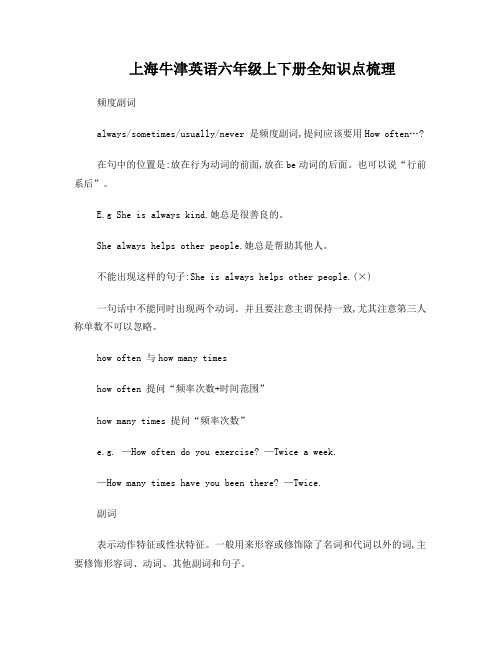
上海牛津英语六年级上下册全知识点梳理频度副词always/sometimes/usually/never 是频度副词,提问应该要用How often…?在句中的位置是:放在行为动词的前面,放在be动词的后面。
也可以说“行前系后”。
E.g She is always kind.她总是很善良的。
She always helps other people.她总是帮助其他人。
不能出现这样的句子:She is always helps other people.(×)一句话中不能同时出现两个动词。
并且要注意主谓保持一致,尤其注意第三人称单数不可以忽略。
how often 与how many timeshow often 提问“频率次数+时间范围”how many times 提问“频率次数”e.g. —How often do you exercise? —Twice a week.—How many times have you been there? —Twice.副词表示动作特征或性状特征。
一般用来形容或修饰除了名词和代词以外的词,主要修饰形容词、动词、其他副词和句子。
He looks very happy.(修饰形容词)The old lady is walking slowly now.(修饰动词)Luckily, he got the first prize.(修饰句子)形容词后面+ly构成副词:slow—slowly slight—slightly quick—quickly careful—carefully fierce—fiercely immediate—immediately gentle—gently lucky—luckily happy—happily介词What else do you do with your…?你和你的…还干什么?With是个介词,后面接人称代词时,要用宾格的形式。
沪教版牛津英语六(上)语法点
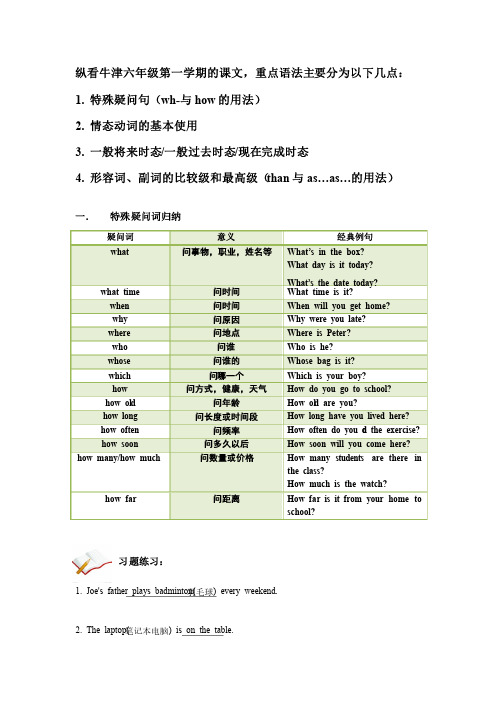
纵看牛津六年级第一学期的课文,重点语法主要分为以下几点: 1. 特殊疑问句(wh-与how 的用法) 2. 情态动词的基本使用3. 一般将来时态/一般过去时态/现在完成时态4. 形容词、副词的比较级和最高级(than 与as as……as as……的用法)一. 特殊疑问词归纳疑问词 意义经典例句what 问事物,职业,姓名等What’s in the box?What day is it today? What’s the date today? what time 问时间 What time is it? when 问时间 When will you get home? why 问原因 Why were you late? where 问地点 Where is Peter? who 问谁 Who is he? whose 问谁的Whose bag is it? which 问哪一个Which is your boy? how 问方式,健康,天气How do you go to school? how ol how old d 问年龄 How ol d are you? d are you? how long 问长度或时间段How long have you lived here? how often 问频率 How often do you d o the exercise? o the exercise? how soon 问多久以后 How soon will you come here? how many/how much 问数量或价格How How many many students are are there there in the class? How much is the watch? how far 问距离How How far far far is is is it it it from from from your your your home home to school? 习题练习:1. Joe's father plays badminton(羽毛球) every weekend.2. The laptop(笔记本电脑) is on the table. 3. My mother is a nurse in the hospital. 4. He gets up at 6:30 in the morning. 5. Li Lei goes to work on foot. 6. It is about 20 kilometers from my home to the town. 7. I have lived in Hang Zhou for 20 years. 8. I’m looking for my watch. 9. The train will start in three minutes. 10. Alice has the violin lesson twice a week. 11. The building with green wall is the post office. 12. He didn’t come because he was ill. 注意事项:由于特殊疑问词孩子们从小学就已经开始接触,对于最基本的what/how/where 等并不感到陌生,出题的难度一般也不会很大。
- 1、下载文档前请自行甄别文档内容的完整性,平台不提供额外的编辑、内容补充、找答案等附加服务。
- 2、"仅部分预览"的文档,不可在线预览部分如存在完整性等问题,可反馈申请退款(可完整预览的文档不适用该条件!)。
- 3、如文档侵犯您的权益,请联系客服反馈,我们会尽快为您处理(人工客服工作时间:9:00-18:30)。
授课日期时间主题现在完成时学习目标1•现在完成时的定义2•现在完成时的构成3•现在完成时的用法教学内容处理上次课课后巩固作业及预习思考内容。
1.复习情态动词2.预习思考现在完成时教学建议:1、根据上节课预习思考的要求,让学生了解现在完成时的概念,列举已经做过的事情;John: Mum, I have already(已经)cleaned them.勤劳的约翰已经刷了牙哦,亲爱的同学动动小脑筋,你还做过哪些事呢?下节课跟小伙伴交流下吧,参考句式:1. 我已经去过了・・・2. 我已经吃过了・・・3. 我已经看过了•…(卡通片、漫画.・・)Keys: 1・ I have already been to the Shanghai Disneyland・2.1have alresday eaten 8 apples・3.1have already seen this movie for 3 times・同学们,从以上句式中,我们可以总结出什么呢?是不是每一句都有个already呢?那already又用于怎样的句式呢?对的,肯定句。
那哪位童鞋可以告诉老师否定句怎么办呢?疑问句呢? 那我们在接下来的课堂当中来具体地学习一下。
other: John, clean your teeth please.现在完成时【知识梳理1]现在完成时的构成1.肯定式:主语+助动词have /has +过去分词+其它【例题精讲】1)My parents and I have been to Century Park during the Mid-autumn Festival.2)I've just read all the new words.我刚读了所有的生词。
(表示不要再读了)3)She has bought some new books.她已经买了些新书。
(表示之后会看)4)We've just cleaned the classroom.我们刚好打扫了教室。
(表明现在教室是干净的)这里的have /has是助动词,没有什么具体意义。
当主语是第三人称单数时助动词用has,其余人称一律用haveo has, have的缩略式分别为I或We。
规则动词过去分词的构成与过去式的构成方式一样,不规则动词可参看不规则动词表。
2.否定式:|主语+助动词have / has+not+过去分词+其它【例题精讲】1)I haven't been in Shanghai for 10 years2)My grandpas hasn't been to Hong Kong.3)I haven't finished my homework yet.我还没有完成我的作业。
4)She hasn't travelled on a train.她没有坐火车旅行过。
5)We have never spoken to a foreigner.我们从来没有和外国人说过话。
有时not可以用never代替,表示“从来没有”的意思。
6 ) I have never seen him before.以前我从来没有见过他。
现在完成时构成否定句时,只需在助动词have / has后面加not就行。
have not, has not的缩略式分别为haven't , hasn'to 另外,肯定句中有some, already时,改为否定时要分别改成any, yet。
3._般疑问式:助动词Have /Has +主语+过去分词+其它把陈述句中的have或has放到句首,句末打问号,同时把句中的some , already改为any , ye t就构成了一般疑问句。
肯定回答用"Yes ,主语+have / has.否定回答用“No,主语+haven't / hasn't. 99有时也可以用"No, not yet. / No , never・ / No, not even once・"等。
【例题精讲】1)—Have you ever made dumplings ?你曾经做过饺子吗?—Yes, I have.是的,我做过。
2 )—Has she ever been abroad?她曾经出过国吗?—No, never.不,从來没有。
3)—Have they found the lost books yet?他们己经找到了丢失的书吗?一Yes, they have.是的,他们找到了。
当句子中有否定词not , hardly (几乎不),never的时候,在改为反意疑问句时,附加部分用肯定形式。
例如:Youhave never come to our school, have you ?你以前从来没有来过我们学校,是吗?【知识梳理2】过去分词的构成方法A:规则变化1.一般情况下,直接在动词原形后面加-ed.worked answered obeyed wanted2.以不发音的-e结尾的动词只加-d.moved hoped divided3.字尾是辅咅+y的动词。
则将y改i加ed.studied tidied satisfied4.以重读闭咅节结尾的词,这些词的末尾只有一个辅音字母时,双写这个辅咅字母,再加-ed.stopped regretted droppedB:不规则变化(详见不规则变化表)【知识梳理3】现在完成时的用法基本用法:表示过去发生或已经完成的某一动作对现在造成的影响或结果。
此时,常与时间副词laheadyl (已经),回(还、已经),|ever| (曾经),|never| (从不)等连用。
I have never travelled by plane before.我以前从来没有乘飞机旅行过。
【巩固练习】 一、用适当的时态填空1. _________ they _________ (be) to the U.S.?一Yes, they have ・2.1 ________ already __________ (buy) three books in the bookshop nearby.3. My grandpa __________ never ___________ (be) to that farm.4. _________ he ever __________ (read) this book?5. She ___________________ (live) here ever since she was ten.6. Both of them ______________________ (be) in Hong Kong for ten days. 7・ The Smiths aren't at home, are they?—No, they ______________________ (go) to Sichuan, their hometown.二、单项选择1. How long have you ________ here? A. comeB. gotC. arrivedD. been2. My grandpa died __________ ・ A. at the age of my 2 B. for 2 years C. when I was 2.D ・ my age was 6.3. Jane has _____ to BeiJing ・ She will come back tomorrow. A. beenB. goneC. went4. It is ten years_____ I last saw he 匚 A. afterB. sinceC. for5. —Who will go to the station to meet Lorry? —I will. I ____ her several times ・ A. metB. have metC. had met6. ・-What a nice dress! How long ____ y ou _____ it? —Just 2 weeks ・A. will, buyB. did, buyC. are, having 7•—Doyou know Lydia very well?—Yes, She and I ____ friends since we were very young.9. —Hello, this is Mr. Green speaking ・ Can I speak to Nk. Black?—Sorry ・ He ____ the Bainiao Park. A. has been to B. has gone to C. went to D. will go to10. — __ you ever ____ to the US?A. has lived D. never beenD. thatD. will meetD. have, hadA. have madeB. have becomeC. have been D ・ have turned8. The Smiths _______ in China for 8 years.B. lived C ・ have been D. live—Yes, twice.D・ were, goingA. Have, goneB. Have, been C, Do, goKeys:1 • Have, been 2. have, bought 3. has, been 4. Has, read 5・ has lived 6・ have been 7. have gone 1-5DCBBB 6-10DCCBB(此部分测试时间为20分钟左右,讲评时间为15分钟左右。
对本次所学内容进行检测)教学建议:1.规定学生必须在20分钟内完成;2.相互交换批改,表扬速度最快及正确率最高的学生;3.做对的学生给做错的学生讲题;4.让每个学生简单总结一下错误原因及应该注意的问题。
5.指导学生把错题整理在学霸错题本上。
L Multiple Choices1. Both his parents look sad ・Maybe they whafs happened to him •A. knewB. have knownC. must knowD.will know2. Zhao Lan already in this school for twoyears .A. was ; studyingB. will ; studyC. has ; studiedD. are ; studying3. Harry Potter is a very nice film .1 it twice •A. will seeB. have seen C・ saw D. see4. It ten years since he left the army.A. isB. hasC. willD. was5. Miss Green isnl in the office. She to the library.A. has goneB. wentC. will goD. has been6. My parents Shandong for ten years .A. have been inB. have been toC. have gone toD.have been7. Where John ?To the library. He there for an hour.A. has…beerr・・has goneB. has・・・gone…has beenC. did・・・go…wentD. did…be…went8.I _______ the way. I _________ here for quite many years.A. knew-have livedB. knew-liveC. know •••have lived D・ know-live9. ____ you ever ______ America? Yes, I have.A. Have-•• gone toB. Have••-gone inC. Have •••been toD ・ Have •••been in10. My brother ____ college for over three years ・A. has gone toB. has been to C ・ has been inD. has been atIL Choose the best answers.M 匚 and Mrs. White have three daughters ・ They are Alice, Kitty and Rose. Rose is the youngest of the three daughters ・ She is two years younger than Alice. Alice is thirteen. She and Kitty are twins. They are all pretty and lovely. They study in the same school. Their parents are both doctors, but they don't work in the same hospital. They love their daughters very much.The Whites all like fruit, but they don't like the same fruit ・ Alice likes apples, Kitty likes oranges and Rose likes bananas. Mr. White likes pears. So does Mrs. White ・ So at home Mr. and Mrs. White give their daughters nicknames. They call Alice "Apple — Kitty H Orange n and the youngest M Banana H . They call each other's names, when their parents call their nicknames. Their house is full of laughter (笑声).()1 ・ There arepeople in the Whites 1 family. B. four)2. Rose is)4. Mr and Mrs WhiteIIL Fill in the blanks with the given letters*Earth is one of the n 1 planets in the Solar System (太阳系).There are living things on the Earth ・ Our Earth is beautiful. There are r 2 and streams ・ There are h 3 and mountains ・ There are woods and f4 ___ ・ They are all very beautiful. However, there is a a lot of pollution on the Earth. They are air pollution, waterpollution and land pollution. So we must stop p 5 the Earth• We must s 6 the Earth and k 7 it clean and beautiful.“我的总结”包含2个方面:C. fiveD. sixA. three years older than Alice C. three years younger than Kitty )3. Kitty is —A. elevenB. two years younger than Kitty D. as old as Kittyyears old.B ・ thirteenC ・ fourteenD. fifteenA. work in the same hospitalB. both like their children C ・ are both teachers D ・ work in the same schooll.C )5. H Banana u isnickname. A. Rose'sC. Alice'sD. Mr. White's1. n2.3. h4. i5.6. 7.22・ nine 23. rivers24. hills 25. forests 26. polluting 27. saveB. Kitty's2. B3. B4. B5. A A. three 28. keep1、老师引导学生针对达标检测错题进行反思和总结;2、老师引导学生对精讲提升相关知识进行总结,可采用表格、思维导图等形式呈现。
